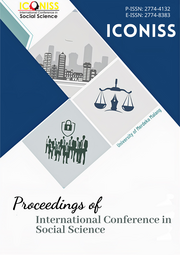Village Fund Management for Sustainable Village Development
DOI:
https://doi.org/10.26905/iconiss.v3i1.9683Keywords:
Village development sustainability, Village fund managementAbstract
Based on the Law about Villages, village authorities are covering the Implementation of Village Administration, Implementation of Village Development, Village Community Development, and Village Community Empowerment based on Community Initiatives, Origin Rights, and Village Customs. In order to run the government and develop the village, adequate funding support is needed. Since 2015 until now, the Village has received Village Funds sourced from the State Revenue and Expenditure Budget (Anggaran Pendapatan dan Belanja Negara – APBN), which the amount of it is always increasing from year to year in order to accelerate the implementation of village development. However, the current problem is that there are some Village heads and Village apparatuses (the ones that manage the Village Funds) who do not carry out the rules that have been stipulated in the legislation. The focus of this research is limited to the Village Fund management for the sustainability of village development, and legal settlement of authority abuse by the Village head in the Village Fund management. The purpose of this study is to analyze the Village Fund management for the sustainability of village development and to review the legal settlement of authority abuse by the Village head in the Village Fund management. This study uses a normative legal research method with a statute approach and a conceptual approach. The expected contribution of this study and research is theoretically for the development of legal science and practice can provide input to village officials in managing village funds, and law enforcement officials in resolving the misuse of village funds, as well as for other researchers as reference material for further research related to the village funds management and the resolution of village funds misuse.
Downloads
References
Bruggink. (1996). Reflections on law (basic understanding in legal theories). Bandung: PT. Image of Aditya Bakti.
Fauziah, N., & Hermawan, S. (2022). Implementation of the Village Financial System (Siskeudes) to improve village financial management accountability. Indonesian Journal of Cultural and Community Development, 13, 10-21070. https://doi.org/10.21070/ijccd2022788
Hadjon, P.M. et al. (2011). Hukum administrasi dan tindak pidana korupsi. Yogyakarta: Gadjah Mada University Press.
Hartono, S. (1994). Legal research in indonesia at the end of the 20th century. Bandung: Alumni.
Hutchinson, T. (2002). Researching and writing in law. Sydney: Lawbook CO.
Indroharto, I. (1993). Usaha Memahami Undang-Undang Tentang Peradilan Tata Usaha Negara. Jakarta: Pustaka Sinar Harapan.
Law Number 6 of 2014 concerning Villages.
Law Number 30 of 2014 concerning Government Administration.
Minister of Finance Regulation number 93 of 2015 concerning Procedures for Allocation, Distribution, Use, Monitoring and Evaluation of Village Funds.
Ministry of Home Affairs Regulation (Permendagri) Number 20 of 2018 concerning Village Financial Management.
Regulation of the Minister of Villages, Development of Disadvantaged Regions and Transmigration Number 13 of 2020 concerning the Priority for the Use of Village Funds in 2021.
Ridwan, H. R. (2014). Government discretion & responsibility. Yogyakarta: FH UII Press.
Downloads
Published
Issue
Section
License
Authors who publish in this journal agree to the following terms:
(1)Â Copyright of the published articles will be transferred to the journal as the publisher of the manuscripts. Therefore, the author confirms that the copyright has been managed by the journal.
(2) Publisher of Proceedings of International Conference in Social Science is the University of Merdeka Malang.
(3) The copyright follows Creative Commons Attribution–ShareAlike License (CC BY SA): This license allows to Share — copy and redistribute the material in any medium or format, Adapt — remix, transform, and build upon the material, for any purpose, even commercially.

